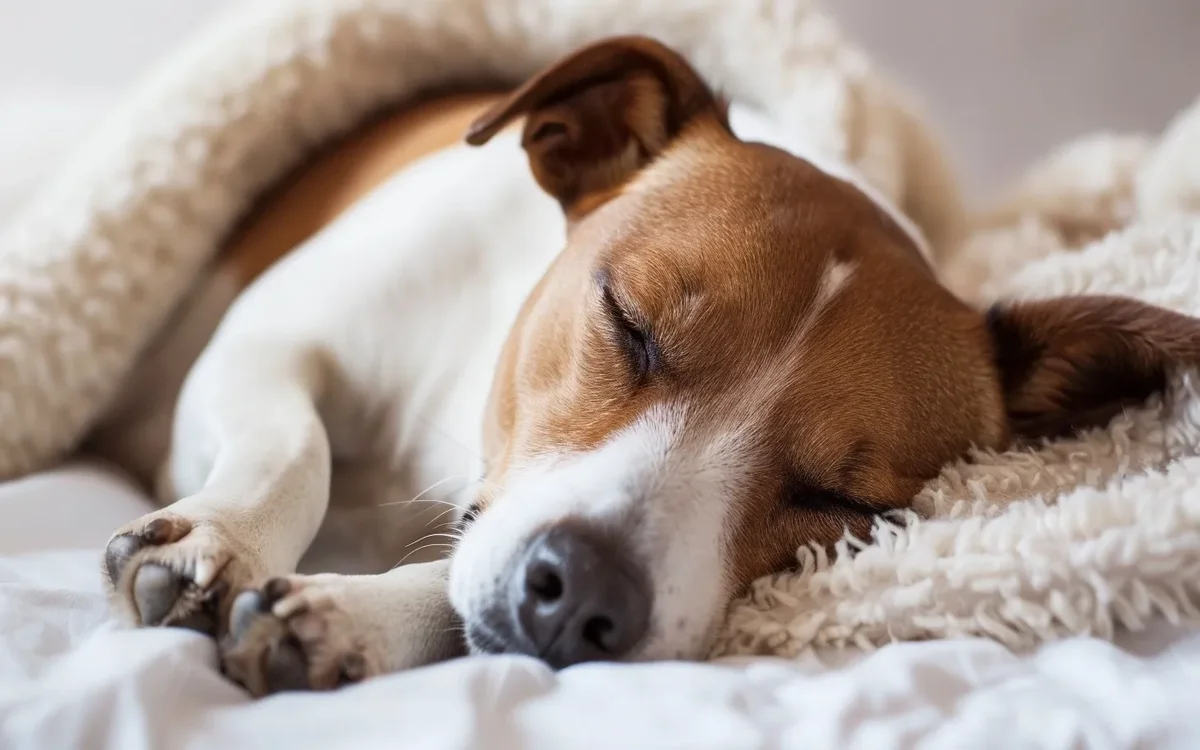If your beloved dog seems less enthusiastic about playtime, they’re likely catching up on some much-needed sleep. Sleep plays a crucial role in a dog’s life; they typically spend 12 to 14 hours a day sleeping, and that doesn’t even include their restful, awake moments of lounging. But what drives this significant need for sleep?
Several factors, from genetic predispositions to environmental influences, contribute to the amount of sleep your dog needs. These elements can significantly dictate whether your dog is more of a sleepyhead or an energetic explorer. Interested in understanding why your furry friend enjoys so much snooze time? Continue reading to uncover the six key reasons behind dogs’ extensive sleeping habits!
Introduction
Let’s face it, our canine companions seem to have mastered the art of relaxation. They can doze off in the blink of an eye, snooze for hours on end, and even turn napping into an Olympic sport. But have you ever wondered why dogs sleep so much? It’s not just laziness, I promise!
As a devoted dog lover and seasoned content developer for MDogsW.com, I’ve spent countless hours researching and observing our furry friends. And I’m here to tell you that there’s more to their slumber than meets the eye.
In this article, we’ll delve into the fascinating reasons behind your dog’s snooze-a-thon. We’ll explore how age, breed, and even diet can influence their sleep patterns. We’ll uncover the secrets of their sleep cycles and share practical tips to ensure your pup gets the rest they need.
Whether you’re a new dog owner or a seasoned pro, understanding your furry friend’s sleep habits is essential for their overall health and well-being. So, grab a cup of coffee (or a bone for your pup) and let’s embark on this sleepy adventure together!
Why Do Dogs Sleep So Much?
As much as we love to see our furry friends bouncing around with boundless energy, their frequent naps and extended slumber parties can leave us scratching our heads. But before you start questioning their work ethic, let’s dive into the fascinating reasons behind their sleep habits.
Age: The Sleepy Puppy and the Senior Snoozer
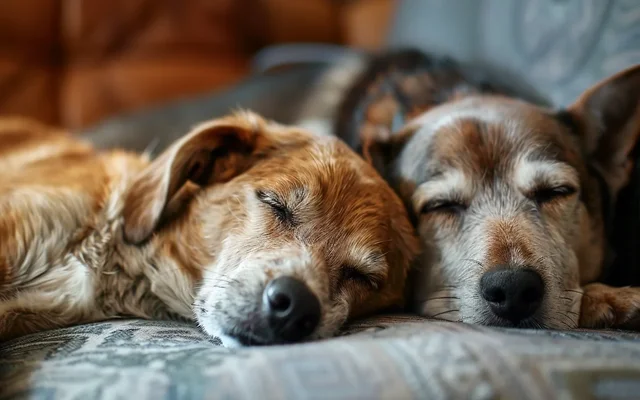
If you’ve ever raised a puppy, you know firsthand how much they sleep. Those tiny furballs seem to be in perpetual dreamland, catching zzz’s between playtime and meals. This is perfectly normal, as puppies need a significant amount of sleep for their growth and development. Think of it as their way of recharging for their next round of zoomies!
On the other end of the spectrum, senior dogs also tend to sleep more than their adult counterparts. As their bodies age, they may experience decreased energy levels and require more rest to maintain their overall health. It’s like a well-deserved retirement for their paws and noses!
Breed: The Big Sleepers and the Energizer Bunnies
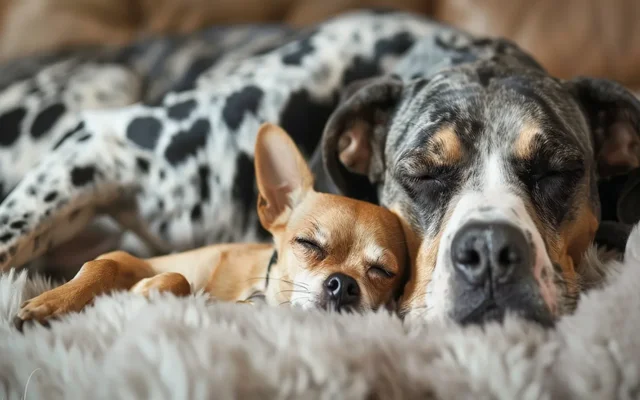
Just like humans, different dog breeds have unique sleep patterns. Larger breeds, such as Great Danes and Saint Bernards, are known for their love of napping. Their larger bodies require more energy to function, and sleep helps them conserve those precious resources.
On the other hand, smaller breeds, like Chihuahuas and Jack Russell Terriers, may seem like they’re always on the go. Their high energy levels and active personalities mean they require less sleep than their larger counterparts. It’s like having a tiny, furry Energizer Bunny in your home!
Health: When Sleep Signals Something More
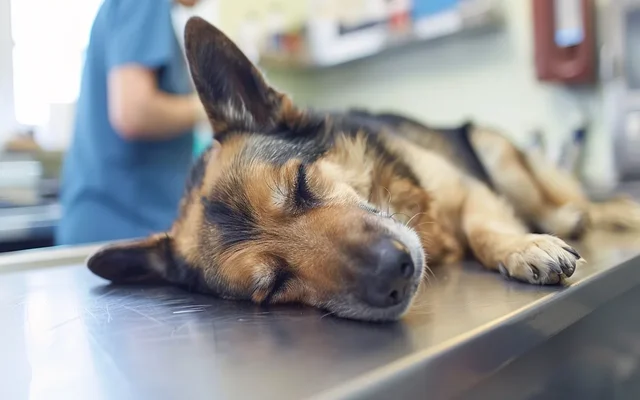
While sleep is essential for all dogs, excessive sleepiness can sometimes indicate an underlying health issue. If your furry friend suddenly starts sleeping more than usual, it’s important to pay attention to any other changes in their behavior or appetite.
Conditions such as pain, illness, or medication side effects can all contribute to increased sleepiness. If you notice any concerning changes, don’t hesitate to consult your veterinarian for a thorough check-up. Early detection and treatment can make a world of difference for your pup’s health and happiness.
Activity Level: The Couch Potato vs. The Marathon Runner

It’s no secret that active dogs need more rest than their less active counterparts. Working dogs, like police K9s and service animals, often have demanding jobs that require them to be alert and focused. To compensate for their high energy expenditure, they need plenty of sleep to recharge.
On the other hand, if your furry friend spends most of their day lounging on the couch, it’s not surprising that they’ll catch more zzz’s than a working dog. However, it’s important to ensure that even couch potato pups get enough exercise to maintain a healthy weight and prevent boredom. A tired dog is a happy dog, after all!
Diet: The Food Coma Factor
Have you ever noticed your pup snoozing after a hearty meal? It’s not just a coincidence! Just like us, dogs can experience a “food coma” after eating, especially if they’ve indulged in a large or rich meal. This post-meal drowsiness is a natural response as their bodies focus on digestion and nutrient absorption.
While it’s perfectly normal for dogs to nap after eating, it’s important to monitor their overall food intake and ensure they’re not overeating. Excessive weight gain can lead to various health problems, including joint issues and diabetes, which can further affect their sleep patterns.
If you’re concerned about your dog’s weight or diet, consult your veterinarian for personalized recommendations. They can help you determine the appropriate portion sizes and feeding schedule for your furry friend, ensuring they maintain a healthy weight and sleep soundly through the night.
How Much Sleep Do Dogs Need?
While it may seem like our furry friends are professional nappers, their sleep needs vary significantly depending on various factors. Understanding how much sleep your dog requires is crucial for ensuring their well-being and addressing any potential concerns.
Average Sleep Duration
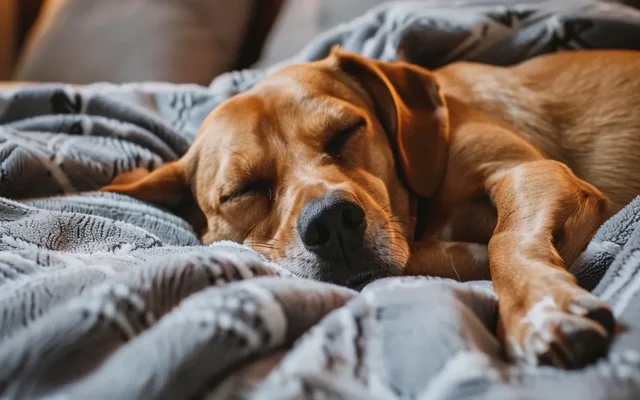
On average, adult dogs need between 12 to 14 hours of sleep per day. However, this is just a general guideline, as individual needs can differ based on age, breed, and activity level.
Let’s take a closer look at the average sleep duration for different life stages:
- Life Stage – Average Sleep Duration
- Puppy (up to 1 year): 18-20 hours
- Adult Dog (1-7 years): 12-14 hours
- Senior Dog (7+ years): 14-18 hours
As you can see, puppies and senior dogs require significantly more sleep than adult dogs. This is due to their growing bodies and decreased energy levels, respectively. Adult dogs, on the other hand, typically have a more consistent sleep schedule, although it can still vary from day to day.
Factors Affecting Sleep Duration

Aside from age, several other factors can influence your dog’s sleep duration:
- Breed: Larger breeds tend to sleep more than smaller breeds due to their higher energy expenditure.
- Activity Level: Active dogs who engage in regular exercise may need more sleep to recover and repair their muscles.
- Health: Underlying health conditions, such as pain or illness, can disrupt sleep patterns and lead to increased sleepiness.
- Environment: A quiet and comfortable sleep environment can promote longer and deeper sleep.
- Stress or Anxiety: Emotional distress can also impact sleep quality and duration in dogs.
It’s important to note that these are just a few of the many factors that can affect your dog’s sleep. If you’re concerned about your furry friend’s sleep habits, it’s always best to consult your veterinarian for personalized advice and guidance. They can help you determine if your dog’s sleep patterns are normal or if there’s an underlying issue that needs to be addressed.
Tips for Promoting Healthy Sleep in Dogs
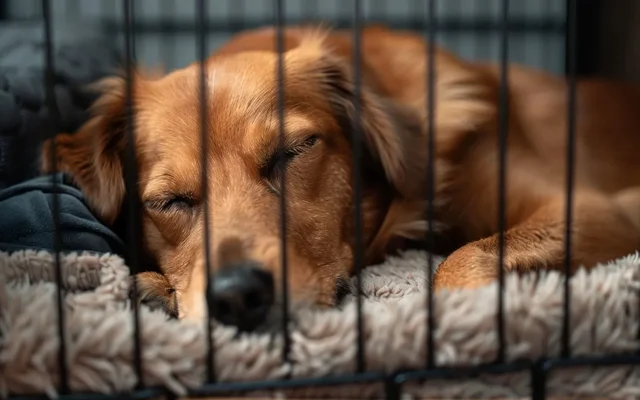
As devoted pet parents, we want nothing more than for our furry friends to be happy and healthy. And a good night’s rest is a crucial part of that equation. By implementing a few simple strategies, you can help your canine companion achieve the restful sleep they deserve.
Create a Consistent Sleep Schedule
Dogs, like humans, thrive on routine. Establishing a consistent sleep schedule can work wonders for their sleep quality and overall well-being. Set regular bedtime and wake-up times, and stick to them as closely as possible, even on weekends. This will help regulate your dog’s internal clock and promote a healthy sleep-wake cycle.
Provide a Comfortable Sleep Environment
Imagine trying to sleep on a lumpy mattress in a noisy room – not exactly a recipe for restful slumber, right? The same goes for our furry friends. Make sure your dog has a cozy and inviting bed in a quiet, low-traffic area of your home. Opt for a bed that’s the right size and firmness for your dog’s breed and age, and consider adding a blanket or pillow for extra comfort.

Encourage Regular Exercise
A tired dog is a sleepy dog! Regular exercise is crucial for maintaining your pup’s physical and mental health, and it can also help them sleep more soundly at night. Aim for at least 30 minutes of moderate exercise each day, such as brisk walks, playtime in the park, or a game of fetch in the backyard.
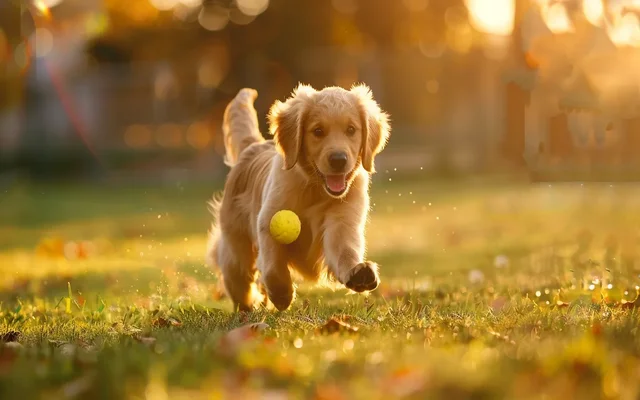
Address Underlying Health Issues
If your dog is consistently experiencing sleep problems, it’s important to rule out any underlying health issues. Conditions such as arthritis, anxiety, or hormonal imbalances can all disrupt sleep. If you suspect your dog may be suffering from a medical condition, schedule a visit with your veterinarian for a thorough check-up and diagnosis.
Consider Sleep Aids and Supplements
In some cases, sleep aids and supplements may be beneficial for dogs struggling with sleep issues. However, it’s crucial to consult your veterinarian before giving your dog any medication or supplement, as some may interact with existing medications or have adverse side effects. Your vet can recommend safe and effective options based on your dog’s individual needs and health history.

Monitor Their Sleep Patterns
Keep track of your dog’s sleep patterns and note any significant changes. Are they sleeping more or less than usual? Are they waking up frequently throughout the night? By monitoring their sleep habits, you can identify potential problems early on and address them before they escalate. If you notice any concerning changes, don’t hesitate to contact your veterinarian for advice.
Conclusion
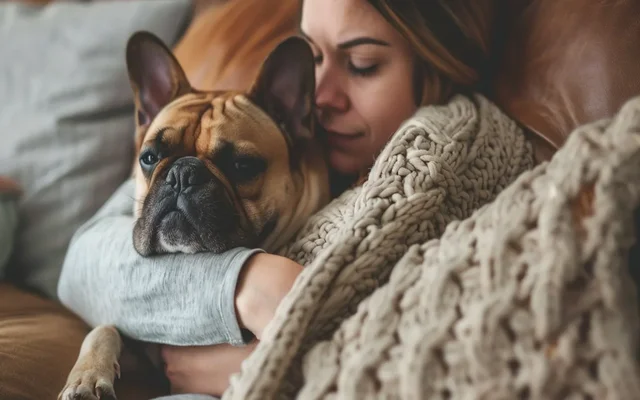
Understanding your dog’s sleep patterns is like unlocking a secret code to their well-being. By recognizing the factors that influence their sleep duration and implementing the tips we’ve discussed, you can ensure your furry friend gets the rest they need to thrive.
Remember, a well-rested dog is a happy, healthy dog. They’ll be more alert, playful, and eager to join you on your daily adventures. So, the next time you see your pup snoozing away, don’t disturb them. Let them enjoy their slumber, knowing that you’ve provided them with the tools for optimal rest and rejuvenation.
If you have any concerns about your dog’s sleep habits or notice significant changes in their sleep patterns, don’t hesitate to consult your veterinarian. They can help you determine the underlying cause and recommend appropriate solutions to ensure your furry friend gets the best sleep possible.
After all, our dogs deserve a peaceful slumber just as much as we do. So, let’s make sure they have a cozy bed, a quiet environment, and plenty of love and affection to dream about. Sweet dreams, furry friends!
FAQs
Why do dogs sleep so much more than humans?
Dogs and humans have vastly different sleep needs due to a combination of evolutionary factors, energy expenditure, and sleep cycles. Dogs, as descendants of wolves, have adapted to conserve energy through sleep, especially after bursts of activity like hunting. Their sleep cycles also differ, with more time spent in deep, restorative sleep.
My dog is suddenly sleeping a lot more than usual, should I be worried?
While dogs naturally sleep a lot, a sudden increase in sleep can sometimes signal an underlying health issue. If accompanied by changes in appetite, behavior, or energy levels, it’s crucial to consult your veterinarian for a check-up. Early detection and treatment can make a significant difference in your dog’s health.
Do different dog breeds really need different amounts of sleep?
Yes! Just like people, dog breeds have varying sleep needs. Generally, larger breeds and puppies tend to sleep more due to higher energy expenditure and growth requirements. Smaller, more energetic breeds might sleep less. However, individual variations exist, so observing your dog’s specific patterns is key.
Can dogs dream, and does that affect how much they sleep?
Research suggests that dogs do dream, exhibiting similar brain activity to humans during REM sleep. While dreaming itself doesn’t directly affect total sleep time, a fulfilling sleep cycle with adequate REM sleep is essential for your dog’s mental well-being and overall restfulness.
How can I tell if my dog is sleeping enough, or if they’re sleeping too much?
There’s no one-size-fits-all answer, as ideal sleep duration varies per dog. However, a healthy dog should wake up easily, be alert and playful when awake, and have a consistent sleep schedule. If your dog seems lethargic, sleeps excessively even after activity, or shows sudden changes in sleep patterns, consulting your vet is recommended.
Can my dog’s emotions affect how much they sleep?
Absolutely! Just like humans, dogs experience a range of emotions that can influence their sleep. Stress, anxiety, or even excitement can disrupt sleep patterns, leading to either increased or decreased sleep duration. Creating a calm and secure environment for your dog can help promote healthy sleep habits.
Does my dog’s diet play a role in how much they sleep?
Yes, diet can subtly influence your dog’s sleep patterns. While it won’t drastically alter their overall sleep needs, certain foods can affect energy levels and digestion, impacting how restful their sleep is.
- High-protein diets: Can provide sustained energy, potentially leading to less napping during the day.
- Carbohydrate-heavy meals: May cause blood sugar spikes and crashes, leading to restless sleep or mid-day fatigue.
- Fatty or rich foods: Can be harder to digest, potentially causing discomfort and disrupted sleep.
It’s best to feed your dog a balanced diet that’s appropriate for their age, breed, and activity level. If you notice any changes in your dog’s sleep after a meal, consult your veterinarian to rule out any underlying issues or sensitivities.
Can stress or anxiety cause my dog to sleep more (or less)?
Absolutely! Just like humans, dogs experience emotions that can significantly impact their sleep.
- Stress and anxiety: Can lead to either excessive sleepiness (as a coping mechanism) or insomnia (due to restlessness and worry).
- Excitement: An overly excited dog may have trouble settling down for sleep.
- Boredom: A lack of mental stimulation can lead to lethargy and increased napping.
If you suspect your dog’s sleep is affected by their emotional state, creating a calm and secure environment, providing plenty of mental and physical stimulation, and addressing any underlying anxieties can help improve their sleep quality.
My dog sleeps a lot during the day but is restless at night, what’s happening?
This is a common issue, often due to a mismatch between your dog’s natural sleep cycle and your daily routine. Dogs, especially puppies and younger adults, may tend towards polyphasic sleep, meaning they nap throughout the day and are more active at dawn and dusk.
To address this:
- Increase daytime activity: More playtime, exercise, and mental stimulation can help tire them out for nighttime.
- Adjust feeding times: Avoid feeding too close to bedtime, as digestion can interfere with sleep.
- Limit evening excitement: Keep things calm and quiet in the hours leading up to bedtime.
Are there any supplements or medications that can help regulate my dog’s sleep?
While some supplements like melatonin or calming herbs might be helpful for mild sleep issues, it’s crucial to consult your veterinarian before administering anything to your dog. They can assess your dog’s specific needs, rule out any underlying medical conditions, and recommend safe and effective solutions tailored to your pet.

Healthy dogs mean happy dogs, and that makes me happy! I’m here to share all the tips for keeping your best furry friend in top shape, from puppyhood to their golden years.

